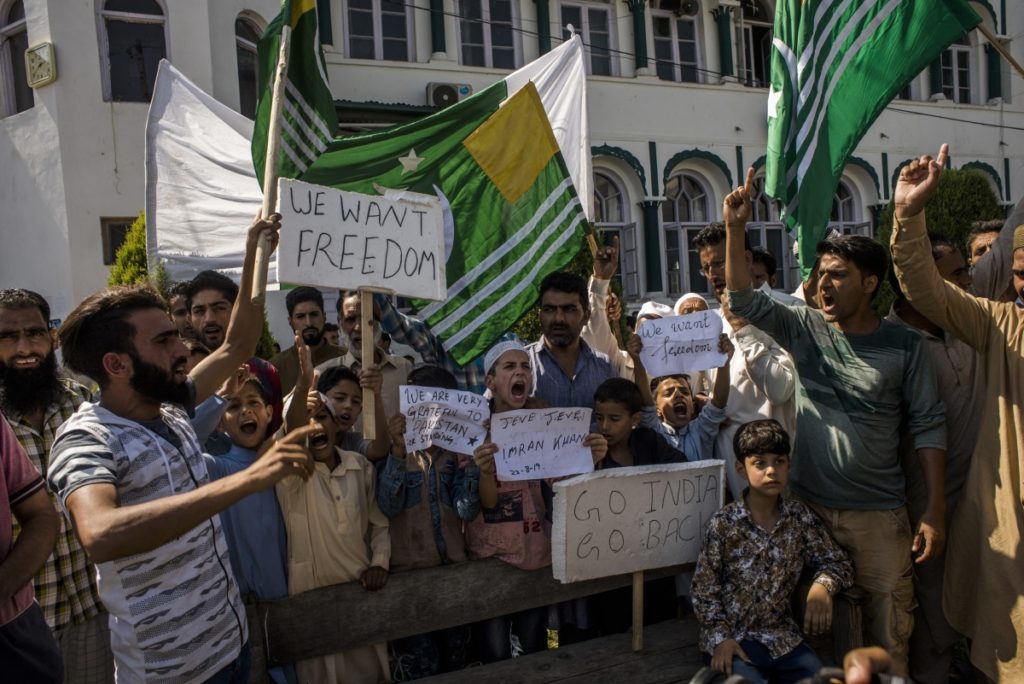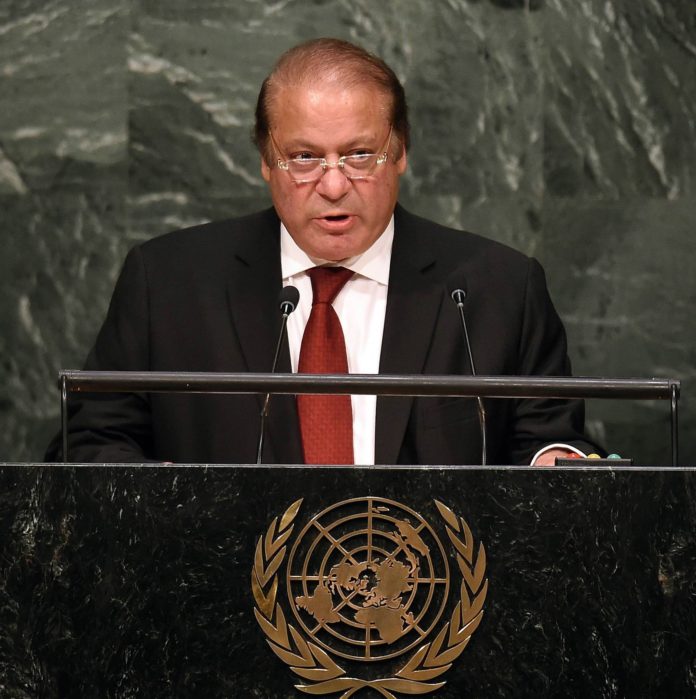During his recent address to the UN General Assembly, PM Nawaz Sharif had said: South Asia needs strategic stability and this requires serious dialogue to achieve nuclear restraint, conventional balance and conflict resolution. He proposed a new peace initiative, comprising four specific and feasible steps: 1) Pakistan and India formalise and respect 2003 understanding of a complete ceasefire in Kashmir and LoC, 2) Pakistan and India reaffirm that they will not resort to the threat of force under any circumstances, 3) Steps must be taken to demilitarise Kashmir, and 4) Agree to mutually withdraw troops from Siachen. India out rightly rejected the proposals and indicated that it wishes to impose a bilateral regime unilaterally. The core issue of these four steps is the Kashmir dispute which has a huge humanitarian dimension.
The people of Jammu and Kashmir across the Line of Control as well as the Kashmiri Diaspora the world over, observed the 69th Black Day to recall and condemn the invasion of Indian army on October 27, 1947. As a part of well-planned conspiracy, India had landed its armed troops in Kashmir and since then it continues to control Kashmir by use of force and military might, instilling fear among the people, subjugating them and usurping all their rights. With each passing year, the Black Day event is attracting enhanced enthusiasm from the friends of Kashmir.
When the terrorism tainted Prime Minster of India Mr. Narendra Modi travels to the UK in mid-November, he shall also be greeted by rallies by Kashmiri diaspora calling for an end to India’s repressive occupation over Kashmir. The UK alongside the US had imposed travel restrictions on Modi on account of his personal culpability in the anti-Muslim riots in Gujarat in 2002 that killed over 2000 Muslims; Modi was then the Chief Minister of Gujarat. Now since becoming Prime Minister, he is brewing unrest in IHK through deliberate provocative actions. He is busy wheeling dealing for abrogating Articles 370 & 35 of Indian constitution which do not recognize IHK as a part of Indian Union; legal validity of this fact has also been recently endorsed by the IHK High Court. During this year, Indian security forces have violated the LoC for more than 400 times resulting in loss of innocent civilian lives and properties.
The Youth Forum for Kashmir (YFK), an international human rights group, has submitted a petition to the five permanent (P-5) and ten non-permanent members of UNSC members offering new ideas to end Indian military occupation of Kashmir. The new ideas work in tandem with the UNSC resolutions on Kashmir. The humanitarian catastrophe in Kashmir has reached critical levels and warrants “an urgent and immediate” international intervention, said YFK in the petition.
Black day was marked with a complete shutdown in Indian Occupied Kashmir and rallies in the world capitals. The call for the shutdown was given by Hurriyet leaders Syed Ali Gilani, Mirwaiz Umar Farooq, Shabbir Ahmed Shah and Muhammad Yasin Malik; it was also supported by pro-freedom organisations and the High Court Bar Association of the Indian occupied territory. A protest demonstration organised by Jammu and Kashmir Democratic Freedom Party was held in Islamabad against the night raids, arrests and harassment of people by the Indian forces; Kashmiri women also participated in the protest in large number. A protest was also held in Srinagar against the desecration of Holy Quran. The Jammu and Kashmir Social Chairman Devinder Singh, addressing the gathering, said that the communal forces had made the Muslims and Sikhs of Jammu their prime target.

In London, the Kashmir Concern, UK, organised a candle vigil at Birmingham on the occasion of the 70th anniversary of the United Nations that coincided with the Foundation Day of AJK government. Likewise, Kashmir Committee Jeddah held a meeting to mark the day. Committee unanimously adopted a resolution, which underscored that in the absence of the right of self-determination, it is not possible for the Kashmiris to enjoy any other rights as recognized by international human rights and humanitarian laws. The resolution expressed gratitude to the Kingdom of Saudi Arabia as well as the Organization of Islamic Cooperation (OIC) for their consistent support to the Kashmir struggle. It urged the OIC to make efforts to harmonize meetings of its Contact Group on Jammu and Kashmir with the meetings of the Human Rights Council and other relevant bodies.
In Srinagar and Rawalpindi, the APHC leaders presented a Kashmir Memorandum to the UN Military Observers Group in India and Pakistan, calling for an early solution to the Kashmir dispute, prevention of massive human rights violations, arrests and killings of Kashmiri youth under various pretexts.
In New York an All Parties Kashmiri ‘Million March’ was held as mark of protest to show to the world that Kashmir dispute has yet to be settled according to the UN resolutions and as per aspirations of the Kashmiris. The march was jointly sponsored by all groups who believe in the right of self-determination of the people of Kashmir. Effort succeeded in mobilizing thousands of people who came from far off places.
On conclusion of March, a memorandum was presented to the Secretary General of the UN, which urged the SG to use his good offices and appoint a person of international standing, like President Mary Robinson, Bishop Desmond Tutu or Kofi Annan, as his special envoy on Kashmir and persuade India and Pakistan to initiate a peace process with the association of United Nations as well as the genuine leadership of the people of Jammu & Kashmir.
In Brussels, Kashmiri community observed the Black Day drawing attention of the European Union to exercise its influence in an early settlement of Kashmir dispute. In Colombo also ‘Kashmir Black Day’ was observed; a peaceful assembly was organized by Kashmir Study Forum, Pakistani and Sri Lankan community camped opposite United Nation Office at Baudaloka Mawatha; the UNSG was urged to exercise the mandate entrusted to him by the UN Charter.
Kashmir dispute has emerged as one of the greatest human crises in history which is marked by extra judicial killings, rape, detention, and kidnapping of Kashmiris. In the Indian Occupied Kashmir more than 94,000 Kashmiris have been killed, out of which over 7000 were custodial killings at the hands of Indian occupation forces. More than 106,000 structures have been destroyed, more than 22000 women have been widowed, over 107,000 children have been orphaned and more than 10,000 women have been raped and molested by Indian military and paramilitary troops stationed in IHK since 1989. Recent surfacing of unmarked mass graves in the valley has laid bare the brutal repression unleashed under the garb of law enforcement. These incidents necessitate UN intervention to safeguard human rights in IHK.
The international community is now alert to the need to normalize the situation in South Asia and this is not possible without ending the massive Indian human rights violations in Kashmir. Kashmiri activists worldwide have intensified their contact campaign with diplomats, politicians and the media everywhere, they feel that this is the best time to convince India to end the military occupation in Kashmir; they are more optimistic today than ever. The Kashmir issue cannot be placed on the back-burner since durable peace in the region can be achieved only by addressing it “upfront”. When it comes to Kashmir, there is no backburner. If history is any guide, the dispute must be addressed upfront for a lasting peace.
There are countless opportunities between India and Pakistan and they must move from conflict management to conflict resolution. A beginning could be made by starting the process of demilitarization and revocation of all draconian laws enforced in IHK.




